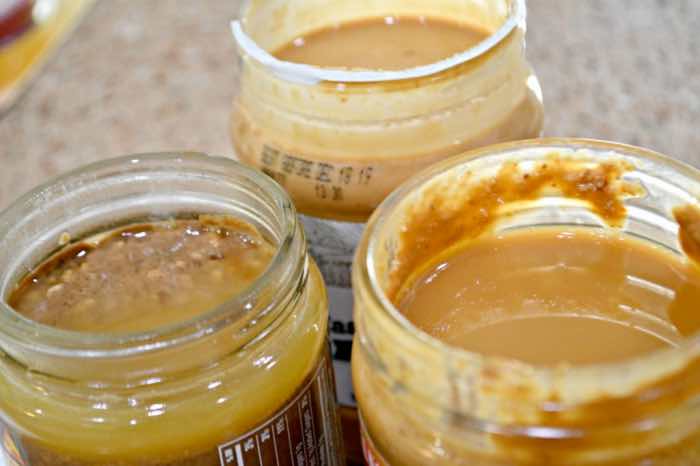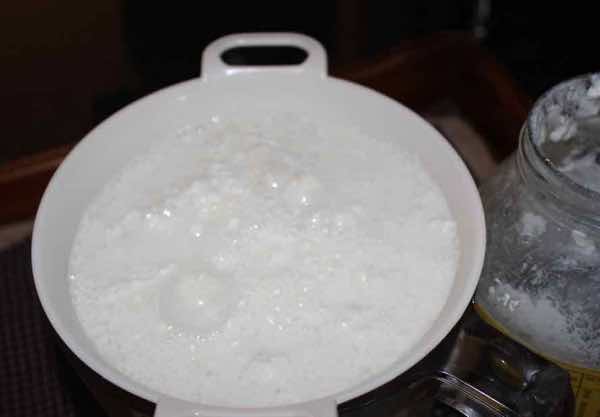- Homepage
- Herbs Spices
- What Is Emulsifier in Food
What is emulsifier in food?
What is emulsifier in food used to disperse lemon juice, for example into olive oil for a salad dressing? These chemicals make up a large part of ultra-processed meals; and are being fingered causing large increases in the risk of cancer, particularly of the breast and prostate; metabolic syndrome and type 2 diabetes.
Emulsifiers make commercial ice cream smooth and creamy; they improve the mouth feel. They make bread which keeps soft and fluffy for weeks. They persuade oil and water-based foods to blend into a uniform consistency. They can be found in over half of the typical produces sold in grocery stores.
We remember a time when peanut-butter, for example came with a film of oil on top. Some consumers obviously found it irritating having to stir the pot before spreading their favourite dressing on a slice of bread with jelly; so food manufacturers started adding emulsifiers to disperse the fat.
Monoglycerides of fatty acids (E471) are commonly used in peanut-butter; they are made synthetically from palm oil.
But on the downside they disturb the microbiome in the gut, alter the permeability of the intestinal wall allowing pathogens and toxins to penetrate and cause inflammation of the bowel.
Three emulsifier have been identified that are particular noxious; CMC, polysorbate 80 and carrageenan.
Common emulsifiers in food

Carboxylmethylcellulose (CMC) is the most commonly added emulsifier; others are xanthan gum and polysorbate 80. Over 170 have been approved by the FDA in America.
Researchers found that foods emulsified with CMC cause abdominal discomfort after meals; often innocent other factors such as the gluten in bread are blamed depending on what's in fashion. Currently in the USA over a third of adults are trying to avoid products with wheat.
Ultra-processed foods make up a large part of typical grocery store meals; 76% of the shelf space in supermarkets. That's where the profit is; follow the money as they say.
If that's where much of your food is coming from then you are eating a lot of emulsifiers.
Large epidemiological studies have in the past linked them with an increased risk for cardiovascular diseases, diabetes and general mortality. New research after following over 100,000 French consumers for nearly seven years has added cancers of the breast, prostate and colorectal region to the list; from emulsifiers incorporated into their daily fare.
Solvent-extracted lecithin
Another emulsifier used in peanut butter is lecithin. It's a natural substance found in both plant and animal tissue; but it is usually extracted using high temperatures and a solvent such as hexane.
Lecithin in fact is an important nutritional substance being the main source of choline, a lipid so significant it really should be listed amongst the B vitamins. But like many vegetable oils, once heated and solvent-extracted it becomes a totally different beast.
The NutriNet-Santé study
The European Food Safety Agency has recently evaluated these food emulsifiers and has no concerns. Yet the NutriNet-Santé study found that consumption of synthetic carrageenans (E407), glycerides of fatty acids (E471) and pectins (E440) increased the overall risk of all types of cancer by 15%; and far more of the breast and prostate.
Highest consumption of sodium bicarbonate (E500) too was associated with a 48% increased risk of malignant breast tumours.
Highest consumption of diphosphates (E450) is also associated with a 45% increase in malignant breast tumours.
Emulsifiers impact negatively on the microbiota
The healthy human alimentary canal is inhabited by many friendly bacteria, viruses and yeasts. These organisms have a profoundly important role in combating generalised inflammation in the body. The researchers state these emulsifiers in food impact negatively on this "normal flora."
The net result is chronic inflammation, the risk of many bowel and other "extra-intestinal" cancers; the breast and prostate for example.
There are many probiotics that will support the normal flora. Researchers are at pains to point out that it not only the number of bugs is important but also the diversity. Thus taking supplements with just a few different bacteria has little value.
Far better is probiotics from our food. For millennia folk have been making sauerkraut, brewing wines, beers and meads and soured milk products such as kefir.
Kefir is to my mind the simplest of them all. It takes about five minutes to make up a smoothie with natural honey, various fruits and finely ground seeds.
Kefir also happens to be the best known source of calcium for the menopausal woman.
 Just a few minutes to prepare kefir
Just a few minutes to prepare kefirMultifactorial
The authors state clearly that malignant tumours are multifactorial; and that emulsifiers in food alone provide only a small risk. However they could well be the straws that break the camel's back; added to other carcinogens such as tobacco smoke, commercial alcohol and stabilisers the danger is very real.
The material expressed on this page is gleaned from the nutritional and environmental literature; it is clearly referenced. A plain distinction is made between the author's opinion and that which is scientifically proven. When in doubt consult your health professional.
To suggest a correction or clarification, write to Dr Bernard Preston here. Contact.
Stabilizers in food
Stabilizers too have a similar role in ultra-processed foods. One that the scientists are recommending we be cautious about.
"In a presentation at the annual Crohn's & Colitis Congress, James D. Lewis, MD outlined research pointing to several food additives including the emulsifiers carboxymethyl cellulose, polysorbate 80 and carrageenan as potential causes of GI inflammation and IBD."
Orthorexia
It's worth nothing the dangers of orthorexia; an extreme concern about the right way of eating. It is a serious antisocial psychological disease. What is emulsifier in food? The risks are small. There is absolutely minimal risk of accepting an invitation to dinner, a communal business lunch or a date with a friend.
But on a daily basis we do need to avoid ultraprocessed foods that contain emulsiers in food; stabilzers, flavour enhancers and other chemicals too. A 48% increased risk of breast cancer from using bicarb (E500) is indeed scary.
Many people use bicarb to brush their teeth on a daily basis; just make sure you spit it all out and rinse your mouth thoroughly. I know longer alkalise my mead when brewing with it.
Peanut butter and jelly sandwiches
We have chosen peanut butter as a typical example of what is emulsifier in food. But there is another good reason to look at the list of ingredients; there is a lot of sugar added to most commercial brands.
Alas the typical PB&J sandwich contains well over 100 grams of carbs; far more than should be eaten at any one meal. They are the highway to insulin-resistance and diabetes; happily there is a solution.
Choose a peanut-butter that has no sugar or emulsifier added; there should be a layer of oil on top; and a low GI loaf of bread.
Industrially-processed pectin
Natural pectin in fruit is one of the most important forms of soluble fibre; it provides the pre-biotic needed by the bugs in the alimentary canal. But once extracted and processed by food manufacturers[2] into an emulsifier it becomes just one more chemical that raises the spectre of a malignant tumour; a massive 55% increase in the risk of breast cancer.
I am sometimes accused of being a scare-monger, a food snob and other such epithets. I gladly don the shirt; having just recently had contact with two patients who have lost loved ones in their thirties to breast cancer, it does worry me. It should bother all of us.
But the natural pectin in fruit is an excellent bioactive compound promoting the wellbeing of the gut, reducing the absorption of cholesterol and helping to alleviate constipation.
Emulsifier in tahini
We regularly use tahini in our home; it's a butter made from sesame seeds. There are two options on the shelves. One is imported from a small Greek island, with a layer of oil on top; the other is smooth and creamy. Knowing now what is emulsifier in food, I hope you are able to make the right choice.
What is emulsifier in food?
What is emulsifier in food is a disturbing question of wellness. Added to the many other chemicals like stabilizers and flavour-enhancers, it could be the straw that breaks the camel's back. The increased risk of cancer is substantial, especially of the breast and prostate.
When browsing use right click and "Open Link in New Tab" or you may get a bad gateway signal.
Newsletter
Our newsletter is entitled "create a cyan zone" at your home, preserving both yourself and Mother Earth for future generations; and the family too, of course. We promise not to spam you with daily emails promoting various products. You may get an occasional nudge to buy one of my books.
Here are the back issues.
- Lifestyle and ideal body weight
- What are ultra-processed foods?
- Investing in long-term health
- Diseases from plastic exposure
- Intensive lifestyle management for obesity has limited value
- A world largely devoid of Parkinson's Disease
- The impact of friendly bacteria in the tum on the prevention of cancer
- There's a hole in the bucket
- Everyone is talking about weight loss drugs
- Pull the sweet tooth
- If you suffer from heartburn plant a susu
- Refined maize meal and stunting
- Should agriculture and industry get priority for water and electricity?
- Nature is calling
- Mill your own flour
- Bake your own sourdough bread
- Microplastics from our water
- Alternative types of water storage
- Wear your clothes out
- Comfort foods
- Create a bee-friendly environment
- Go to bed slightly hungry
- Keep bees
- Blue zone folk are religious
- Reduce plastic waste
- Family is important
- What can go in compost?
- Grow broad beans for longevity
- Harvest and store sunshine
- Blue zone exercise
- Harvest and store your rainwater
- Create a cyan zone at your home
Did you find this page interesting? How about forwarding it to a friendly book or food junkie? Better still, a social media tick would help.
- Homepage
- Herbs Spices
- What Is Emulsifier in Food
Address:
56 Groenekloof Rd,
Hilton, KZN
South Africa
Website:
https://www.bernard-preston.com